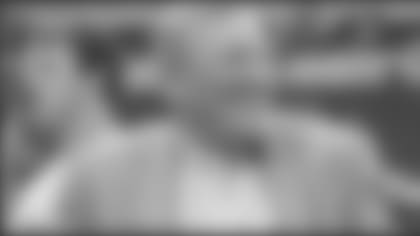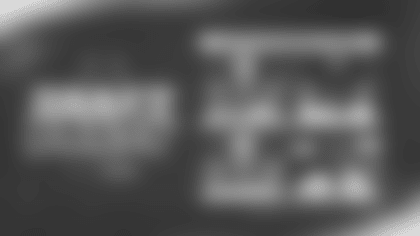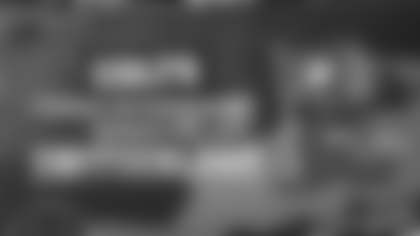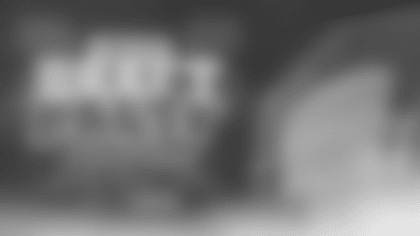Bill Polian, in his 12th season as Colts president, has a resume
unique in the NFL. One of two men to win NFL Executive of the Year
five times, Polian in the 1980s built the Buffalo Bills into a
four-time Super Bowl participant. In the mid-1990s, he built the
expansion Carolina Panthers into a team that made the NFC
Championship Game in its second season, 1996. Since joining
Indianapolis in 1998, he built the Colts from a 3-13 team in 1997
and 1998 into one that has made the playoffs 10 of the last 11
seasons, including an AFC Championship Game appearance after the
2003 and 2006 seasons, AFC South titles in 2003, 2004, 2005, 2006
and 2007 and a Super Bowl championship following the 2006 season.
Each week during the season, in The Polian Corner, Polian and
Colts.com will discuss issues pertinent to the Colts and the rest
of the NFL.
*Question: A 34-17 victory over the Seattle Seahawks on Sunday at Lucas Oil Stadium. On the surface, this was an impressive victory. Your thoughts . . .
A:* It was very interesting. I've often said we in this building and people essentially in the media and outside live in parallel universes. I was less than thrilled when I went home Sunday night. When we had our meeting (Monday) morning after viewing the film, that sentiment was echoed by virtually everyone. We have a standard of performance here, and the standard of performance is high. We've often told the players it's important to meet the standard of performance, win or lose. If you meet the standard of performance, more than likely you're going to win over 85 percent of the time. For about three quarters Sunday, we met the standard of performance – albeit grudgingly on offense. Then, it all went to the dogs in the fourth quarter. We played maybe the worst fourth quarter in all three phases this season. We weren't happy about that. Nobody was. I'm sure the players heard that Monday afternoon. The good thing about it is we didn't meet our standard of performance, but we played well enough to win. You get the 'W' and you move on and you try to make sure that next week you meet the standard of performance. While everyone outside is euphoric and talking about 4-0 and we're on our way – undefeated, Super Bowl championship and all the hyperbole that flies around – that's as far from the truth as it possibly can get. Our passing game was good Sunday, not great. The quarterback got hit too many times, and we had too many pressures. Our running game was very average. We had far too many plays that didn't pan out the way they should have. Defensively, for three quarters we played a heck of a game. The quarterback was outstanding, obviously. That's obvious and very courageous on a couple of occasions where he stood in there and delivered the ball. The kicking game could have been a lot better, particularly on the onside kick, which was very hurtful in a lot of ways. It put your defense back out on the field. It doesn't allow you to kneel the game out. You run the risk of injury, etc. By and large, we didn't meet the standard of performance, but it is a 'W' and we'll take it, and now we work to get better and especially get ready for a team we know well and who knows us well – the Tennessee Titans.
Q: And Tennessee – this is a good team despite the 0-4 record . . .
A: Absolutely. There's no question about it. They have had all kinds of injury issues, which they obviously have had some difficulty dealing with. The most recent one is to (former Colts cornerback) Nick Harper in the secondary. Their secondary is banged up. They didn't have Nick for a good portion of the game Sunday, and they didn't have Cortland Finnegan, their All-Pro. That part of it will straighten itself out over time. They still have that extremely potent running game. They still have (quarterback) Kerry Collins. Nate Washington has turned into a pretty good receiver for them. (Tight end) Bo Scaife is his go-to guy. That's a team that was good enough to go deep into the playoffs and win the division last year, so we're not lulled into believing there's anything terribly wrong there – again, parallel universe.
Q: Another big defensive performance Sunday by the Colts. What's the difference between Miami, when the Colts allowed 239 yards rushing, and the last two weeks?
A: First of all, it's systemic. We controlled the run against Miami from conventional formations about as well as we've controlled it the last two weeks. What we did not control was the Wildcat and the 'A' formation. Those were based upon in Miami's version – which is very good – misdirection, the ability to confuse keys, the ability to make us stop and read rather than read on the run and play fast, which is how we play defense. Almost systemically, they took us out of what we wanted to do and what we're equipped to do. That didn't happen the last two weeks, and it didn't happen in Miami when they were in conventional formations, by and large. That's the short answer. That begs the question, 'Can Tennessee do it?' The answer is, 'Yes, they can.' Do we expect they will? The answer is, 'Yes, we do.' They could run it with (quarterback) Vince (Young). They could run it with (quarterback) Kerry (Collins). They could run it with any number of people. I could see them running it with Vince and both backs in the game. There are any number of ways they can do it. We'll have to wait until Sunday night to figure out which one it is, but I'm pretty sure we're going to see one version or another of it. Maybe all three.
Q: Can you talk about the progression of Colts second-year WR Pierre Garcon and rookie WR Austin Collie? Is it a several-year progression to get them where you want them to be? And how do you find such players?
A: There's no question about that (the progression). The way you find them is through good scouting, having a good scouting system and putting yourself in a position where you can recognize that kind of talent and have measurements and measurables that allow you to say, 'This guy will succeed. We think there is a chance that he will succeed.' So, that system is in place, and it has served us well over time. I said when we drafted Pierre – when no one knew his name or necessarily cared who he was – that he reminded me a little of (former Buffalo Bills wide receiver) Andre Reed. I hope his career lasts as long, and I hope he goes to the Hall of Fame, as Andre deserves to. No one would ever think that lightning would strike twice, but certainly I think he's going to have a good NFL career. Austin is a bit different in that he has not had an offseason. He is learning as he goes. He's a very smart player. He has come from a sophisticated system at Brigham Young, albeit one that is different than what we play here. So, he has some learning still to do. He has some habits to still break that are not in sync with what we do. He has adjusting to do in terms of what (Colts quarterback) Peyton (Manning) wants to do with certain routes, but he's holding his own, doing fine and he's working hard. That gives him a great leg up. He works awfully hard and he's awfully bright, so he will get better as time goes by. It takes about four years for a receiver to reach his peak in the National Football League, then you can expect that he will be up there for five, six, sometimes 10 years depending on how lucky they get with injury. I would expect both guys will have good careers. Pierre is the typical example of a young player in the National Football League. I'm always fond of quoting (Hall of Fame Head Coach) Marv Levy. When asked by a booster once who the best rookies this year were he responded, 'Last year's rookies,' because a player makes no bigger jump than that between his first and second years in the National Football League. He makes a huge jump physically. He becomes a man and not a boy. Because he's now working full-time and has access to the right meals, etc., etc. He doesn't have to go to class. He can work at his job. Then there's just physical maturation anyway, going from age 21 to 22 or 22 to 23. There's still a growth process there. Secondly, he has the benefit of a full season and then an offseason working with his coaches and understanding what it is he's facing. The game does slow down for them. As the years go on, between years two and three and three and four, the game slows down even more. That's the phrase, 'The game slows down.' It means that they recognize what the opposition is doing. They recognize the speed at which the game is played. They recognize the intensity of effort it takes to succeed. By and large, that's the growth process. You're seeing it very clearly with Pierre, who played a little less than Austin has as a rookie, but nevertheless, he played. He showed us he had what it took to succeed. You will see it much more with Austin next year when he has a chance to have an off-season program and get his feet firmly planted on the ground in the offense.
Q: Pierre really has become a strong blocker . . .
A: He's a very, very good blocker. Both men are. He's physical. He's hard-nosed. He enjoys the physical part of the game. He enjoys running after the catch. He likes the physical part of it. He'll go in there and mix it up. It's a great thing.
Q: How much does the health of the offensive line help?
A: I think it helps to have continuity. It's probably in an area that we wished had performed a little bit better in terms of overall production over the four games. There is room to improve, but it is getting better. It was better Sunday – it was not consistent, but it was better Sunday in pass protection than it has been in a while. You can see the picture starting to come together. The run game still has a ways to go, but (Senior Offensive Line Coach) Howard (Mudd) is working on that. I know it will improve. The one thing about football is teams never stay the same. They either get better or they get worse. We have been getting better. The offensive line has been getting better over time. That curve is up and as long as they all stay healthy, it sort of accentuates that growth and accentuates that improvement. Hopefully, it will stay that way. (Left tackle) Charlie (Johnson) apparently is not too serious. As long as we can stay fairly healthy and stay consistent and become more consistent than we've been, particularly in the running game, then we're going to be a better football team. We're going to get better as the season goes on, and we'll have a better chance to meet our standard of performance each week.
Q: Running back Donald Brown is a good runner, but there's more to his game, isn't there?
A: In this system, there's a great deal more than running the ball. There's blitz pickup. You have to be able to pick up a linebacker, and you have to be able to protect the quarterback. The second thing you must do is catch the ball. You must be able to run routes and you must understand the adjustments that take place with route-running and the recognition of coverage. Then, you must understand what the audible system is and how to adjust in that sphere. It's a difficult job. It isn't just, 'Line up in the 'I' formation and get the ball.' It's much more difficult than that, and he's done a great job of that. He's extremely intelligent and very diligent. He works at it. He has great hands, as we know. He can run after the catch, and he has a real burst when he gets into the open area. He can fly. It's been fun to watch him and he, too, will get better. He has been a really good blocker from Day One. He's one of those guys like (cornerback) Jerraud Powers where you just come in and take a look at two or three practices and say, 'Put him in the lineup. There he is. No problem with that at all.'
Q: You're considered one of the top talent evaluators in the NFL. Is there an area where you feel like you are weaker than others?
A: If you wanted to boil it down and say on a scale of 1-to-10 what might be below seven, it probably would be offensive line, but I've learned so much working with Howard and Tom Bresnahan and Jim Ringo over the years that if that's not a strength it's certainly not a weakness at this point. I know what to look for and recognize. But that's probably not the most natural area. It's hard to take one look at an offensive lineman and say, 'Yes, he can play,' or, 'No, he can't play' where the gentlemen I mentioned who are all great offensive line coaches can do that. At most other positions I can take one look and say, 'Yeah, he can play,' or, 'No, he can't play.' Then it takes me a little longer to figure out where you would put him in the draft or whether you'd want him on your team. There's lots of other work to be done, but that first yes or no I can pretty much do with every other position other than offensive line.
Q: There are no scouting courses in college. How do you learn it?
A: First of all, you have to have a talent for it. I don't think you can be successful at it over time if you don't have a talent for it. It has to come naturally. That's true of everything at this level. If you're going to be at this level, it's based on talent to start with. God gives you that, whether it's to hit a curve ball or to be able to spot a pitcher who can throw 95 miles per hour with control. It's all the same thing. God gives you that ability. Then, it's a question of harnessing that ability and using it and honing it and learning as much as you can so that in that process you bring to bear lots and lots and lots of experience. The only way to get better at that is to do it, to look at tape – to see as many games and practices as you can, to concentrate on all of the little, minute details. I remember when I first started scouting, patterns would develop. You could see patterns just jumping off the page at you as you wrote notes on people. But if you don't write the notes and you don't look at the tape and you don't go to the games and practices, you'll never develop the talent just as Tiger (Woods) would never have been anything more than a good amateur golfer if he hadn't worked at it to the extent that he does. That's the nature of it. It starts with talent, but then it ends with hard work and dedication, and I think you have to like what you do. You really have to like what you do. If I could go to three football games every Saturday, if the good Lord would let my body hold out to do it, I would be the happiest guy in the world.
Q: You get a lot of credit, but you've talked some in the past about the pride you take in the scouting system the organization uses...
*A:* We have a scouting system that allows us to find these kinds of players. This is not a one-man show by any means. In fact, it's anything but. We have seven college scouts and two supervisors and a director who are out there on the road every single week. We have a system that is very complex, very detailed that allows us to find these players, and we have scouts who work terribly hard. On a Monday night during the season, every single of one of them is in an airplane or a car headed for another stop that they're going to make tomorrow. They do get essentially one-and-a-half weekends home every month for about six months straight. They're out on the road. They're the guys who unearth the talent in the first instance. The area scout – in this case, Matt Terpening – who went into Mount Union said, 'Hey, here's a guy who can play, Pierre Garcon.' The system allows him to say, 'I want the other people in the system to take a look at Pierre Garcon.' Then, Pierre's tape and his bio and all of his information goes up the line and we're able then at that point to say, 'Listen, we think Pierre Garcon can play.' All of that costs a great deal of money – millions every year. That does not include one penny for technology. Unfortunately, we're required to spend by the league a lot of money on technology, which I don't think gives us the kind of return we need, but this is millions of dollars that goes into this. (Colts Owner and Chief Executive Officer) Jim Irsay willingly spends it, pats everybody on the back and says, 'Go out and find some more Pierre Garcons. Go out and find some more Austin Collies. Go find some more Jerraud Powers.' That's why we win, because we have the commitment from the owner to build the scouting system that I'm proud to say is second to none in the National Football League. There are some that are certainly on par with us, but I don't think we take a backseat to anyone. There's a commitment we've made as a franchise and that Mr. Irsay has made to you as an owner. It isn't insignificant in terms of dollars – in fact, it's very significant. More importantly, it's extremely, extremely time-consuming and effort-consuming on the part of the scouts, who are just magnificent and dedicated people.
Q: How much does character play a role?
A: Character means a lot. Now, what most people have taken to calling character we call football temperament. That means a) is the player a good citizen? Does he obey the law? Does he do what he's supposed to do in terms of his living in society; b, is football important to him? Is he dedicated to it? Is he going to do the things that are necessary to be able to maximize his talent? That includes on and off the field. We recognize these are guys between 19 and 22. The vast majority of them are single. Everybody goes through that stage in life, so we're not looking for altar boys or choir boys. We're looking for football players who are good citizens and who are dedicated to the game. Next, we want to know, 'Can he process information under pressure in a football situation?' Lastly, 'Is he tough?' Because the National Football League is no place for anyone who is not tough. You won't survive physically in the National Football League if you're not tough. That's what we consider football temperament. We find those kinds of guys because we charge the scouts to do that and they do a great job of it.
Q: Do you expect a lot of trick plays from the Titans and will the Colts be ready for the Wildcat offense?
A: I think the answer on both counts is, 'Yes.' I don't know how ready you can be for some of the real creative gadgetry that (Titans special teams coach) Alan Lowry and (Head Coach) Jeff Fisher come up with on special teams, but as long as we've played them, we've seen a lot of it. I'm sure they have other new nuances up their sleeves. We'll be expecting it. I don't know how prepared we'll be, but we'll be expecting it. I would think since they'd had success against us with the Wildcat in the past, and since they saw that Miami had some success with it (against the Colts), I would think they're probably giving it serious consideration.
Q: How tough is that if that's not a normal formation they run?
A: I'm not sure it is not a normal practice. I would think that given the talent they have – (running back) Chris Johnson and Vince Young – that they probably have had a package in almost from mini-camp, some Wildcat package. They have to have Vince prepared to play. And he would be antithetical to what Kerry does, so I would think they probably have a package that they practice from Day One. They just haven't used it yet. I wouldn't be at all surprised to see them dust it off and really, that's all they would be doing is dusting it off. I'm sure he goes into every game with a certain package of plays from the shotgun with the options, runs and passes and things of that nature that we've seen in the past. It's ready and they've practiced it. They don't have to make very much adjustment to use it.
Q: Can you discuss a timetable for the return of S Bob Sanders?
A: He's continuing to work out and he's doing well. I think the graph is up. I don't want to put any timeframe on it. I don't want to do that. We're encouraged in terms of what we see. We think he's on schedule and moving forward at a pretty rapid and expected clip.
Q: Were you surprised Colts DE Dwight Freeney played Sunday despite a quadriceps injury that kept him out of practice last week?
A: I was and I wasn't. There's no question in my mind that it takes an extraordinary person to do what he did. But as I said last week, I asked him as we were leaving the stadium in Arizona, 'How are you feeling?' He said, 'I'm going to make it. I can walk OK. It's not sore.' He spent the entire week going through a series of all kinds of treatments and exercises and what have you to get ready. No one works as hard to keep his body in tip-top shape as Dwight does. So, I wasn't surprised that he made it, but it was a superhuman effort. No question about it.
Q: He seems to be off to as good a start as he ever has had in eight NFL seasons . . .
A: It's a little early to take a look at the statistics, but my sense is that's correct. Now, as good as Dwight has been – and he's been terrific and this is probably as good a start as he has had – (Colts defensive end) Robert Mathis has been absolutely off the charts. If he doesn't get (AFC) Defensive Player of the Week this week, it's a shame. He really has been incredible. You know how hard it is to get one sack a game, much less get three – plus caused fumbles and things of that nature. He just continues to play at an incredibly high rate. He's a Pro Bowler. He's everything you want in a football player.
Q: What is the team doing to ensure Peyton Manning will retire with the Colts?
A: That would be our aim. I don't know whether you can achieve that or not. A lot depends on what kind of a labor situation we have. We will very likely enter an uncapped year next year. There are special rules for that situation in terms of how you allocate money. Then, when we come out of that – hopefully with a labor agreement – there will be special and new rules I'm sure as to how you allocate money and how money is counted under the salary cap and what have you. All of those things remain to be seen. We could probably do a standard, garden-variety contract that would pass muster under any kind of scenario. That's something we're looking at right now. Whether that would meet Peyton's needs, I don't know. It's a down-the-road project. It's not something that has to be done immediately. It's not something we're working on as a front-burner project, but Jim (Irsay) is right. Our goal, our aim, our whole approach is to make sure Peyton finishes his contract here and finishes his career here and goes directly from Lucas Oil Stadium to Canton and the Hall of Fame, and I'm confident we can get it done. It isn't something that's going to happen overnight, and it is affected in terms of the long term by whatever labor agreement may be reached.
Q: A very nice tribute to former Colts running back Edgerrin James Sunday . . .
A: It was great to see Edgerrin Sunday. I must admit we borrowed the video tribute from the Boston Red Sox, who do everything right. I got a chance to see their tribute to Pedro Martinez, when he came back with the New York Mets. It was extremely heartwarming. We took the format from that and obviously the idea we shared with them in terms of wanting to honor players who had left. That happens in today's game, but you shouldn't just let the player go and never have the opportunity to say, 'Thank You.' Edgerrin is just a terrific guy and still a very good football player. I had an opportunity to talk with him after the game. We had a great talk. It was terrific to see him. He was, as he always is, smiling, laughing, joking, happy to be wherever he is, lights up the room with his smile. He told me he was touched by the ovation and the tribute, and that's nice to know because that's what it's designed to do. You hope the player can feel the affection and the gratitude you have for him and toward him. As the graphic on the screen said, we can't wait to have him back here and put him up on the wall.
Q: What moment from his time with the Colts stands out?
A: Somebody was talking recently about his first run in a preseason game in New Orleans and how all the players said, 'Whoo, who is this?' I remember it as though it were yesterday, turning to Dom Anile and nodding our heads and saying, 'That's what we drafted. There he is.' Twelve thousand yards later, he's on his way to Canton, I would think. He'll probably retire as the 10th leading rusher of all time. If that doesn't get you into Canton, I don't know what does. He's a great player and a great guy and a great Colt. It's a real tribute to our fans that they acknowledged him the way they did Sunday and the way they did for (former Colts wide receiver) Marvin (Harrison) at the end of last season. These are special guys who provided special memories. One of the reasons they enjoy being here so much is because our fans are so supportive.
Q: The Colts are 4-0 for the fifth time in seven seasons. To what do you attribute the run of fast starts?
A: What it points to is that you have really good training camps, not really hard training camps, but really good training camps. It means you have a veteran quarterback who can make plays. It means you have a stable system in most cases. It means you have a pretty decent defense, by and large. If you have those ingredients and you have good training camps where you get your work done, but you don't beat everybody up, then you have an opportunity to come out of the gate pretty quickly.
Q: Discuss the special teams this season, if you will . . .
A: Our special teams have improved greatly this year. We've only had problems (previously) with kickoff coverage. (The) return game is a function largely of the returner. If you have a dynamic returner, you're going to have good returns as you saw with T.J. (Rushing Sunday) on the punt return. Punting has never been a problem for us. It cropped up briefly for us last year, but we rectified that. Punt blocking, punt coverage never has been a problem. Kickoff coverage has been the problem, and we rectified that. They had one run Sunday that got out a little long, but instead of breaking it for 70 yards they broke it for 35, and we were able to contain them and make them punt the ball on the ensuing series of downs. That's what you need to do, and we improved greatly in that area.
Q: Final thought on the Tennessee Titans. They're a dangerous team – as any team is when it's wounded . . .
A: I question how wounded they really are. They played a great game against Pittsburgh on the Thursday night opener. They lost on a very, very tough break. They come back, get some injuries and they don't play their best football, but we're only a quarter of the way into the season. This is a team that won the division last year. They unseated us and went deep into the playoffs. They lost to Baltimore in the divisional round, but most people wouldn't have been surprised had they represented the AFC in the Super Bowl, so this is not a good football team. It's a great football team. It is quarterbacked by a resourceful, tough, gritty, hard-nosed Pro in Kerry Collins. He's not going to be frightened or scared or have his back to the wall. He has been here before. Been there, done that. They have a great offensive line that is coached exceptionally well by Mike Munchak. Jeff Fisher, no matter who the defensive coordinator is, you know his fingerprints are all over it. (Former defensive coordinator Jim Schwartz) Schwartzy left and he's now been replaced by Chuck Cecil, but you know Jeff is going to be the inspiration behind all of that. There may not be a better coach at preparing a team for one game in the National Football League than Jeff Fisher. He's a great motivator. He's soft-spoken and quiet, but believe me: he's a great motivator. He's a hard-nosed guy. He'll get his team ready to play. You don't want to play Jeff Fisher's teams in a one-game situation. On top of that, he has an incredible bag of tricks that he has unloaded upon us for the past 11 years. The good part as (Colts Head Coach) Jim Caldwell said Monday morning is our veteran players know how hard a game this is going to be. They know how hard it is to play down there. They know how difficult it is to play against Jeff's teams. They know exactly what's at stake here. This is not going to be any trap game or any of that other nonsense that you hear bandied about. This is going to be an AFC South game. It just happens to be on national television. This is always a great game. It's a heated rivalry. We know what we're in for. This is a team that could easily win 11 in a row and cruise into the playoffs. That's how good they are.















